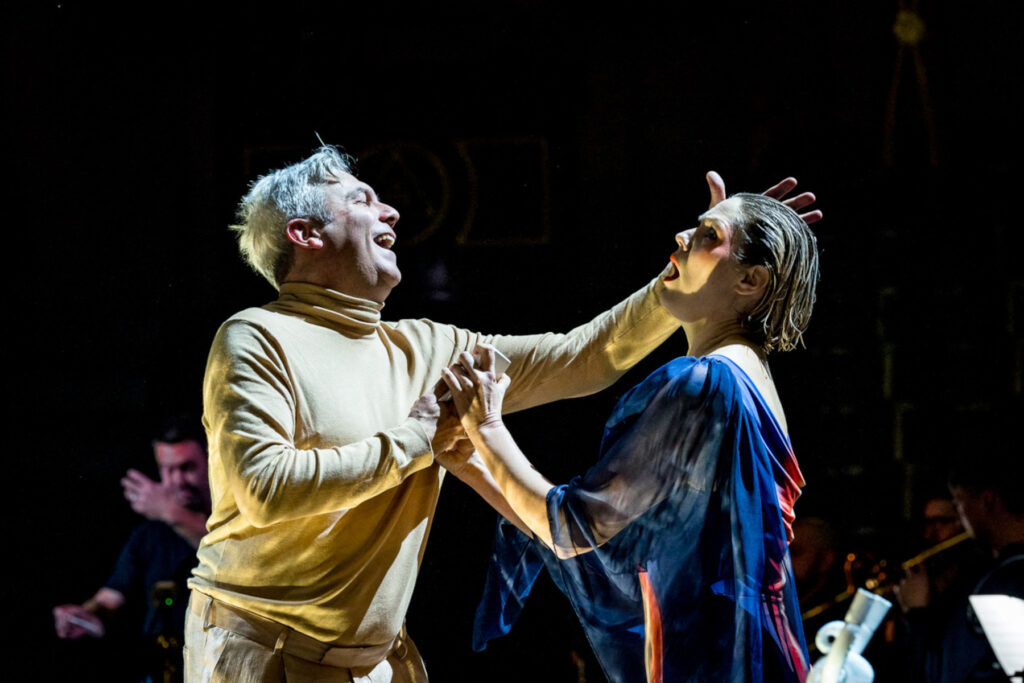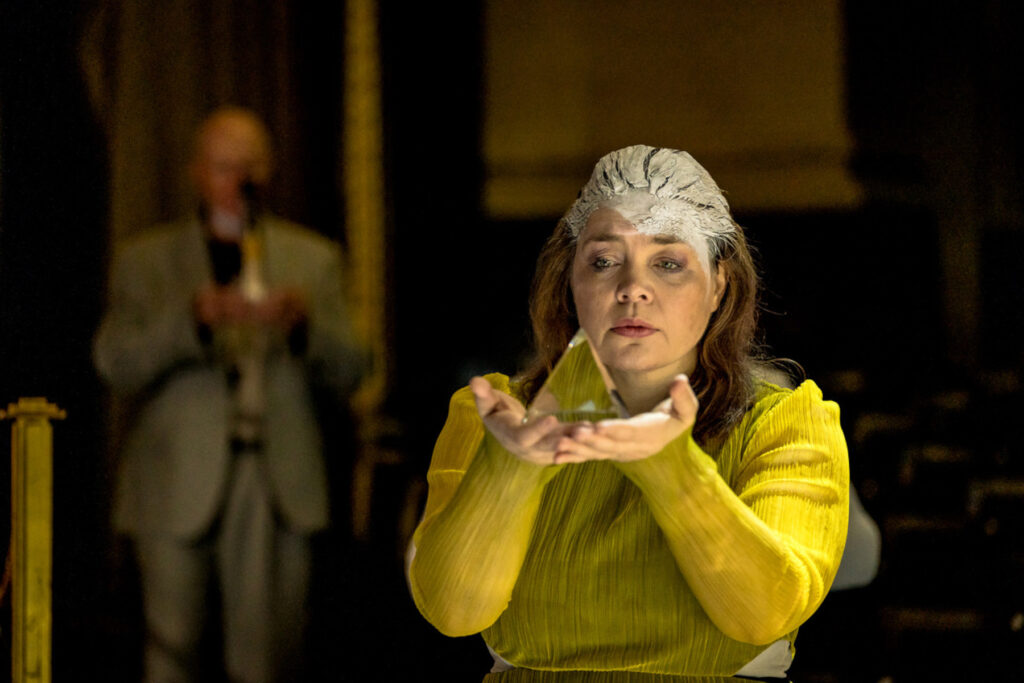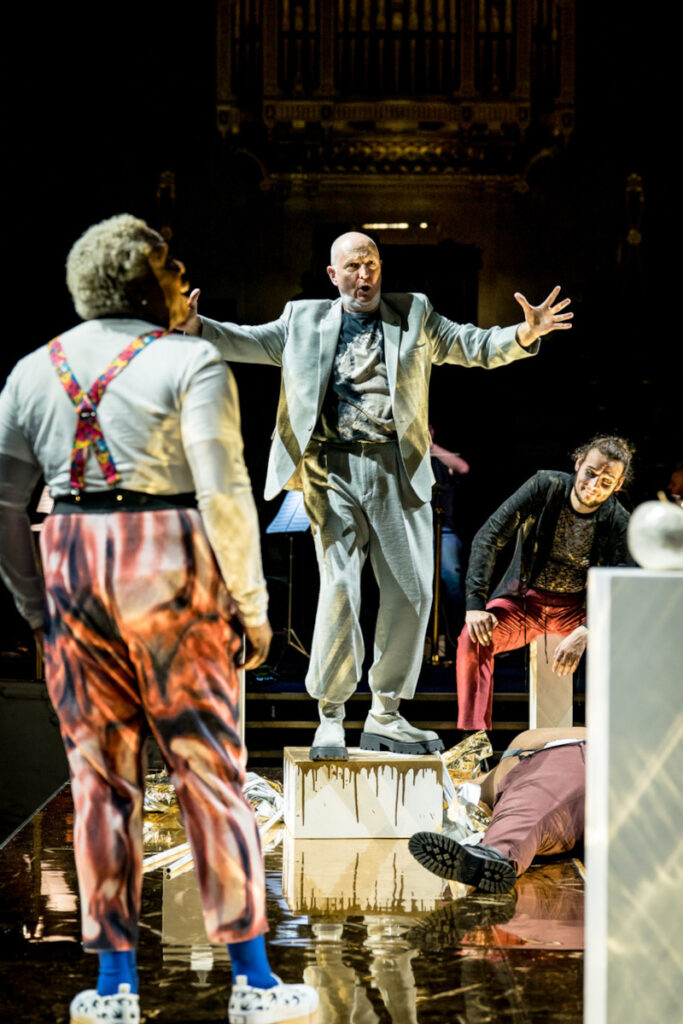Everything about Wagner is big – very big. The instrumentation for the preliminary evening of Der Ring der Nibelungen alone encompasses eight horns doubling on Wagner tubas, seven harps and eighteen anvils tuned to three octaves of F. Reducing that to an ensemble of not quite two dozen orchestral players is in itself quite a feat. Yet that is what Ben Woodward has achieved for Regents Opera, the fringe group that first saw the light of day in 2011 as Fulham Opera. Woodward led his first pocket-sized Ring from the piano back in 2014: sacrilege to some, creative genius to others. Does size really matter? You might as well argue that performances of Handel’s The Messiah given with extremely modest forces in country churches or other small venues have less validity than the inflated numbers which Sir Thomas Beecham once favoured. If it works, it works.
For the only complete Ring cycle being performed in the UK in 2025, Regents Opera has moved to the 900-seat York Hall in the East End of London, more popularly known as a boxing venue. With the instrumentalists positioned on a small stage at one end, directed by Woodward facing outwards (visible to the cast on television monitors in the hall), the action is focused on an eight-metre long performing space in the round. This is a totally immersive experience, the audience close enough to see the spittle fly, the members of the cast within touching distance. It is difficult to imagine storytelling gripping you by the throat in a more telling fashion.

Furnishing this space to serve as three different settings and accommodate groupings of characters was always going to be tricky. The space is demarcated by eight white, slim plinths atop which is perched an assemblage of objects, including a tiny pyramid, a vase, a silver bauble, a hammer and what looks like a miniaturised ArcelorMittal Orbit structure, few of which can be deemed to have much symbolic significance. In such cramped surroundings it is hardly surprising that plinths get knocked over. One of them carries the message in German, Du hast nichts. I spent most of the evening trying to work out if this was an enigmatic comment on materialism. At one stage Alberich removes his singlet to display Gesamt-Kunst-Werk tattooed on his back. One huge problem with this staging is that the first scene, set on the banks of the River Rhine, sees all the characters performing in the vertical. Instead of having a small collection of polystyrene boulders in the middle, around which the Rhinemaidens might have cavorted while being pursued by Alberich as the musical score depicts their slithering and sliding over rocks, they perambulate this way and that in mostly statuesque fashion. There is a trapdoor in the shiny floor covering which allows the principal Nibelungs to make their dramatic entrances, and later Mime makes the most of his opportunities to engage with the horizontal. One nice comical effect occurs at the end of the second scene when a Deliveroo driver attired in snazzy turquoise and emblazoned with Delivering escorts Freia away with the two giants.

Costumes and make-up vary in their impact. The Rhinemaidens each wear stylish gowns with streaks of blue, red and cream; Freia is dressed in apple-green; Fasolt and Fafner appear like two ageing bovver boys complete with braces; Froh’s trousers are a riot of colour matching his name; Loge as the demi-god of fire is now a Goth; Wotan’s eye-patch is a strip of white Elastoplast running down one side of his face, with similar effects for both Fricka and Freia, while Donner’s jaw is masked with the same.
Little gold is in evidence, and certainly not in the opening scene where Alberich’s avarice is paramount. After he has amassed his hoard of wealth in Nibelheim, he covers his bare chest with gold paint, some of which he smears over Wotan’s face after subsequently cursing the ring. The most striking appearance of bullion comes in the final scene after Freia is trussed up on one of the plinths, enveloped in reams of shiny golden wrapping-paper. Nibelheim itself is wreathed in semi-darkness.
In the sound-picture the woodwind and brass inevitably dominate, the strings only coming into their own in moments of tenderness when dynamic levels drop. Yet there are instances where instrumental colour is deployed very effectively, as with the use of the electronic organ while Alberich, wearing the Tarnhelm, turns himself into a serpent, or a single baleful trombone after Fafner kills his brother giant. Coordination between orchestra and singers is less than ideal, and wavering brass intonation takes the gilt off the gingerbread. Tempos are uniformly brisk, sometimes at the expense of majesty, but the descent into Nibelheim is done thrillingly.

Vocally, things are much better. All three Rhinemaidens are excellent, Mae Heydorn doubling the roles of Flosshilde and Erda, where her deeper mezzo tones have maximum impact. Ingeborg Novrup Børch sings a long-suffering Fricka, completely inside all the anguish she feels at her wayward husband’s tilt at world domination. Charlotte Richardson is a fresh-toned and persuasive Freia, the victim of purely male machinations. I found her brother-in-law, Ralf Lukas as Wotan, a little disappointing. Initially, there was too much unsteadiness in the voice, though he recovered authority later, and his dominance of proceedings only really asserted itself at the point where he succeeds in wresting the ring from Alberich. Oliver Gibbs is suitably touchy-feely with the Rhinemaidens, shameless lust well to the fore, though his clean-shaven appearance is at odds with the reference to his prickly beard. He has all the necessary power for a line such as “Wehe! Ach wehe! O Schmerz! O Schmerz!” when Woglinde also rejects his advances. He gives full vent to his rage after Wotan has tricked him into becoming a toad and has chilling force for his furious exchange with Wotan (“Schmähliche Tücke, schändlicher Trug!”) after being compelled to surrender the precious ring. Visually, the two giants are ill-matched, Henry Grant Kerswell’s baritonal Fasolt having more presence and tonal colouring than his unscrupulous brother Fafner, sung by Craig Lemont Walters.
Three vocal soloists stood out for me. Calvin Lee’s mellifluous high tenor as Froh delighted the ear throughout, alive to all the mercurial impishness in the character. I found Loge’s ballet-like gyrations and twerking unsettling, but as sung by James Schouten this was a commanding performance. His insinuations to Wotan (“Was ein Dieb stahl, das stiehlst du dem Dieb“) were full of vibrancy and conviction, with a metallic edge to his gleaming upper register that supported all his vocal fire-power. Topping all of this in terms of characterisation was Holden Madagame as a magnificent Mime. His whining self-pity and writhing on the floor were a class act, with quite terrifying screams as he fled in terror from Alberich.
Even in such a confined performing space and with all the attendant compromises, Wagner’s music and the story itself still manage to cast their spell most impressively. This is a tale of vaunting ambition, insatiable greed, vanity and duplicitousness, creation and destruction as well as a demonstration of ultimate love through redemption. It is a tale for our time.
Alexander Hall
Das Rheingold
Prelude (Vorabend) to Der Ring der Nibelungen
Libretto and music by Richard Wagner
Sung in German and with English surtitles
Arranged for Regents Opera by Ben Woodward
Cast and production staff:
Loge – James Schouten; Alberich – Oliver Gibbs; Wotan – Ralf Lukas; Donner – Andrew Mayor; Froh – Calvin Lee; Mime – Holden Madagame; Fasolt – Henry Grant Kerswell; Fafner – Craig Lemont Walters; Fricka – Ingeborg Novrup Børch; Freia – Charlotte Richardson; Erda/Flosshilde – Mae Heydorn; Woglinde – Jillian Finnamore; Wellgunde – Justine Viani
Director – Caroline Staunton; Set Designer – Isabella van Braeckel; Lighting Designer – Patrick Malmström; Regents Opera Orchestra – conductor, Ben Woodward
York Hall, London, 9 February 2025
Top image: The gods Donner, Froh, Loge, Wotan and Fricka
Photos © Steve Gregson
The second of two cycles begins on 23 February